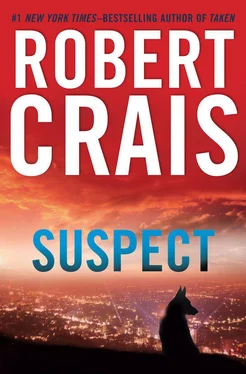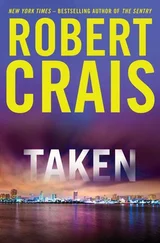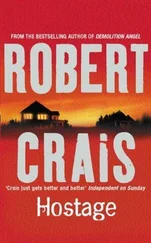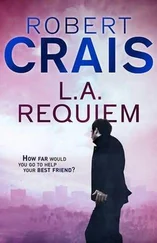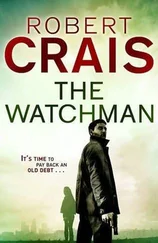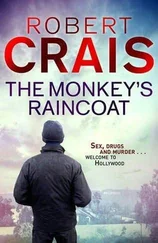Maggie ignored him.
“Jesus, now I’m talking to a dog.”
An exaggerated startle response was common in people who suffered from PTSD, particularly combat veterans, police officers, and victims of domestic abuse. Anyone will jump if someone sneaks up behind them and shouts boo!, but PTSD can amp up the startle response to crazy levels. An unexpected loud noise or a sudden movement near the face could trigger an over-the-top reaction that varied from person to person—screaming, raging, ducking for cover, and even throwing punches. Scott had an exaggerated startle response since the shooting, but was seeing improvement with Goodman’s help. He still had a long way to go, but had made enough progress to fool the review board. Scott wondered if Goodman could help with the dog.
Dr. Goodman often saw clients early before they went to work, so Scott took a chance, and called. Scott expected Goodman’s answering machine, but Goodman answered, which meant he wasn’t busy with a client.
“Doc, Scott James. You got a fast minute?”
“As fast or as slow as you like. My seven o’clock canceled. Are you doing okay?”
“Doing good. I want to ask you something about my dog.”
“Your dog?”
“I got my dog yesterday. A German shepherd.”
Goodman sounded uncertain.
“Congratulations. This must be very exciting.”
“Yeah. She’s a retired Military Working Dog. She was shot in Afghanistan, and I think she has PTSD.”
Goodman answered without hesitation.
“If you’re asking if this is possible, yes, it is. Animals can show the same symptoms as humans. Dogs, in particular. There’s extensive literature on the subject.”
“A big truck goes by, she gets nervous. She hears a gunshot, she wants to hide.”
“Mm-hm. The startle response.”
Scott and Goodman had discussed these things for hours. There were no medicines or “cures” for PTSD, other than talking. Medicines could relieve symptoms like sleeplessness and anxiety, but you killed the PTSD demon by talking it to death. Goodman was the only person with whom Scott had shared his fears and feelings about that night, but there were some things he had not even told Goodman.
“Yeah, her startle response is off the charts. Is there a fast way to help her?”
“Help her do what?”
“Get over it. Is there something I can do, so she won’t jump when a gun goes off?”
Goodman hesitated for several seconds before he responded in a careful, measured tone.
“Scott? Are we talking about a dog now, or you? Is there something you’re trying to tell me?”
“My dog. I’m asking about my dog. She can’t come talk it out with you, Doc.”
“If you’re having trouble, we can increase the anxiety medicine.”
Scott was wishing he had taken a fistful of anxiety meds that morning when he saw Leland’s dark blue pickup pull into the lot. Leland saw him as he got out of his truck, and scowled, no doubt pissed off because Scott was still in his car.
Scott said, “I’m asking about my dog . She’s an eighty-five-pound German shepherd named Maggie. I’d let you talk to her, but she doesn’t talk.”
“You seem irritated, Scott. Did yesterday’s regression cause an adverse reaction?”
Scott lowered the phone and took a few breaths. Leland hadn’t moved. He was standing beside his truck, scowling at Scott.
“I’m talking about this dog. Maybe I need a dog psychiatrist. Do they make anxiety meds for dogs?”
Goodman hesitated for another several seconds, thinking, but this time he sighed before he answered.
“Probably, but I don’t know. I do know that dogs suffering from PTSD can be retrained. I would guess that, as with people, the results are varied. You and I have the advantage of medicines that can augment or temporarily alter our brain chemistry. You and I are able to discuss what happened over and over until the event loses much of its emotional potency, and becomes something more manageable.”
Goodman had gone into lecture mode, which was his way of thinking out loud, so Scott interrupted.
“Yeah, we bore it to death. Is there a short version of this, Doc? My boss is watching me, and he doesn’t look happy.”
“She was shot. Like you, her subconscious associates the sound of a gunshot, or any surprising noise, with pain and the fear she felt in that moment.”
Leland tapped his watch, and crossed his arms. Scott nodded to acknowledge him and held up a finger. One second.
“She can’t talk about it like me, so how do we deal with it?”
“I’ll find out if there are canine anxiety medicines, but the therapeutic model will be the same. You can’t take the bad experience away from her, so you have to reduce its power. Perhaps you could teach her to associate a loud noise with something pleasurable. Then introduce more noises, until she realizes they have no power to harm her.”
Leland had gotten tired of waiting, and was now striding toward him.
Scott watched him approach, but was thinking about the possibilities in Goodman’s advice.
“This is going to help, Doc. Thanks. I gotta go.”
Scott put away his phone, hooked up Maggie, and got out as Leland arrived.
“Guess you and this dog good to go, you got time to yak with your girlfriends.”
“That was Detective Orso at Robbery-Homicide. They want me back downtown, but I put them off until lunch so I can work with Maggie.”
Leland’s scowl softened as Scott expected.
“Why all of a sudden they want you so much?”
“The lead changed. Orso’s new. He’s trying to get up to speed.”
Leland grunted, then glanced at Maggie.
“How’d you and Miss Maggie here get on last night? She pee on your floor?”
“We walked. We had a long talk.”
Leland looked up sharply as if he suspected Scott was being smart, but he softened again when he concluded Scott meant it.
“Good. That would be very good. Now let’s you go work with this animal, and see what y’all talked about.”
Leland turned away.
“Can I borrow your starter pistol?”
Leland turned back.
Scott said, “Can’t have a police dog shit out when a gun goes off.”
Leland pooched out his lips, and studied Scott some more.
“You think you can fix that?”
“I won’t quit on my partner.”
Leland stared at Scott for so long Scott squirmed, but then Leland touched Maggie’s head.
“Won’t do, you shootin’ the gun if you’re workin’ with her. Might hurt her ears, bein’ so close. I’ll have Mace help you.”
“Thanks, Sergeant.”
“No thanks are necessary. Keep talkin’ to this dog. Maybe you’re already learnin’ somethin’.”
Leland turned away without another word, and Scott looked down at Maggie.
“I need more baloney.”
Scott and Maggie went to the training field.
Mace didn’t come out with the starter pistol. Leland came out instead, and brought along a short, wiry trainer named Paulie Budress. Scott had met the man twice during his first week of handler school, but didn’t know him. Budress was in his mid-thirties, and sported a peeling sunburn because he had spent the past two weeks fishing with three other cops in Montana. He worked with a male German shepherd named Obi.
Leland said, “Forget that business with the starter pistol for now. You know Paulie Budress?”
Budress gave Scott a big grin and firm handshake, but put most of his grin on Maggie.
Leland said, “Paulie here worked K-9 in the Air Force, which is why I want him to talk to you. These Military Working Dogs are taught to do things different than our dogs.”
Budress was still smiling at Maggie. He held out his hand to let her sniff, then squatted to scratch behind her ears.
Читать дальше
